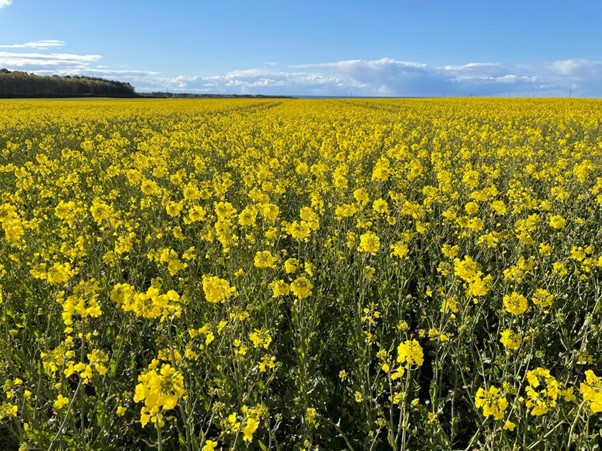Organic Oilseed Rape Production in Scotland
16 June 2021Background
Organically grown oilseed rape is not a crop typically associated with the UK, and certainly not in Scotland. However, this has all started to change over the last few years based around the experiences of a small group of farmers and other stakeholders, with the first commercial crops having been grown mostly in NE Scotland over the last three seasons.
There were a couple of key drivers leading to increased levels of interest in the feasibility of growing the crop organically in Scotland. One was linked to the changes coming through in the organic certification standards linked to production of feed locally, and concerns linked to an over reliance on imported soya in several areas of livestock production. The second was linked to specific nutritional requirements of egg laying hens, and the need for a suitable organically certified ration component to be available.
First attempts at growing organic oilseed rape in Scotland
A study tour to Sweden, where annually around 10,000ha (10% of the overall oilseed rape crop) is grown organically, highlighted precision weeding is a key part of the system used by many of the more successful organic farms growing the crop. In August 2019, five Scottish farmers drilled oilseed rape crops on their organic farms ranging from Morayshire to Tayside.
The System Cameleon, purchased by Murray Cooper after the experience of the Swedish trip, was used on 3 of the farms, at a 25cm row spacing set up to allow the robot-weeder to be employed later in the season, whereas those that opted for more conventional establishment (ploughed, secondary cultivation, drill) were generally narrower at around 12cm, and were more reliant on good establishment and rapid growth to supress weeds.
A range of varieties were used across the farms, but based on the advice from Sweden, hybrid varieties were preferred, under derogation, to encourage rapid establishment and help smother weeds. The majority of the varieties investigated were disease resistant and pod shatter resistant, and fields had been tested prior to sowing to highlight any potential nutrient deficiencies, or excesses, and covered both macro and micro elements, as well as pH and microbial respiration. Typical plant establishment aimed for was around 40-50 plants per m2.
SCottish Organic CANola – SCOCAN
In the autumn of 2019, the group successfully secured some funding through the Knowledge Transfer Innovation Fund (KTIF) and this project was facilitated by Dr Robin Walker from SRUC in Aberdeen. The project really engendered a collaborative effort between all of the farmers, the agronomist, the researcher, the seed processor and SOPA, a certification body also part of the KTIF project, and helped fund the delivery of KE events on three of the farms which acted as pilot studies, one on the farm itself and the others “virtually”, as well as other KE materials including a technical guide and videos.
Harvest
All of the farms swathed their crops around two weeks prior to combining which took place in mid-late August. Three of the winter crops and one spring sown crop were successfully harvested, with yields ranging from around 1.5t/ha up to a little over 3t/ha at 9% MC, with oil content being around 42%. This was a little shy of the Swedish yields, but not too bad for a first attempt. The seed was all bought by Norvite, and as the erucic acid levels were well below the 2% threshold, and certification for human use had been obtained for the processing, the original price of £700 / t was increased to £900 / t due to the more lucrative market now being targeted. All 5 farmers are growing autumn sown organic oilseed rape again this year, and they have been joined by several other Scottish farmers who have been following the trials and tribulations of the project team over the last season at the events, in the press and on social media. Now that the KTIF project has finished, the group of farmers has evolved to become the SCOCAN Association and have pretty much doubled the area of organic crop grown since their first forays in 2019, with agronomic assistance from Elaine Nicol. The season has been tricky, with periods of cold, wet and now dry weather, and although some crops really suffered earlier in the year, in the last month or so they seem to have found some new strength, so it will be interesting to see how they perform when it comes to harvest.
If anybody is interested in enquiring about the SCOCAN Association, please feel free to contact David McClelland (dmcclelland@norvite.com)
Robin Walker SRUC for Farm Advisory Service
Sign up to the FAS newsletter
Receive updates on news, events and publications from Scotland’s Farm Advisory Service

